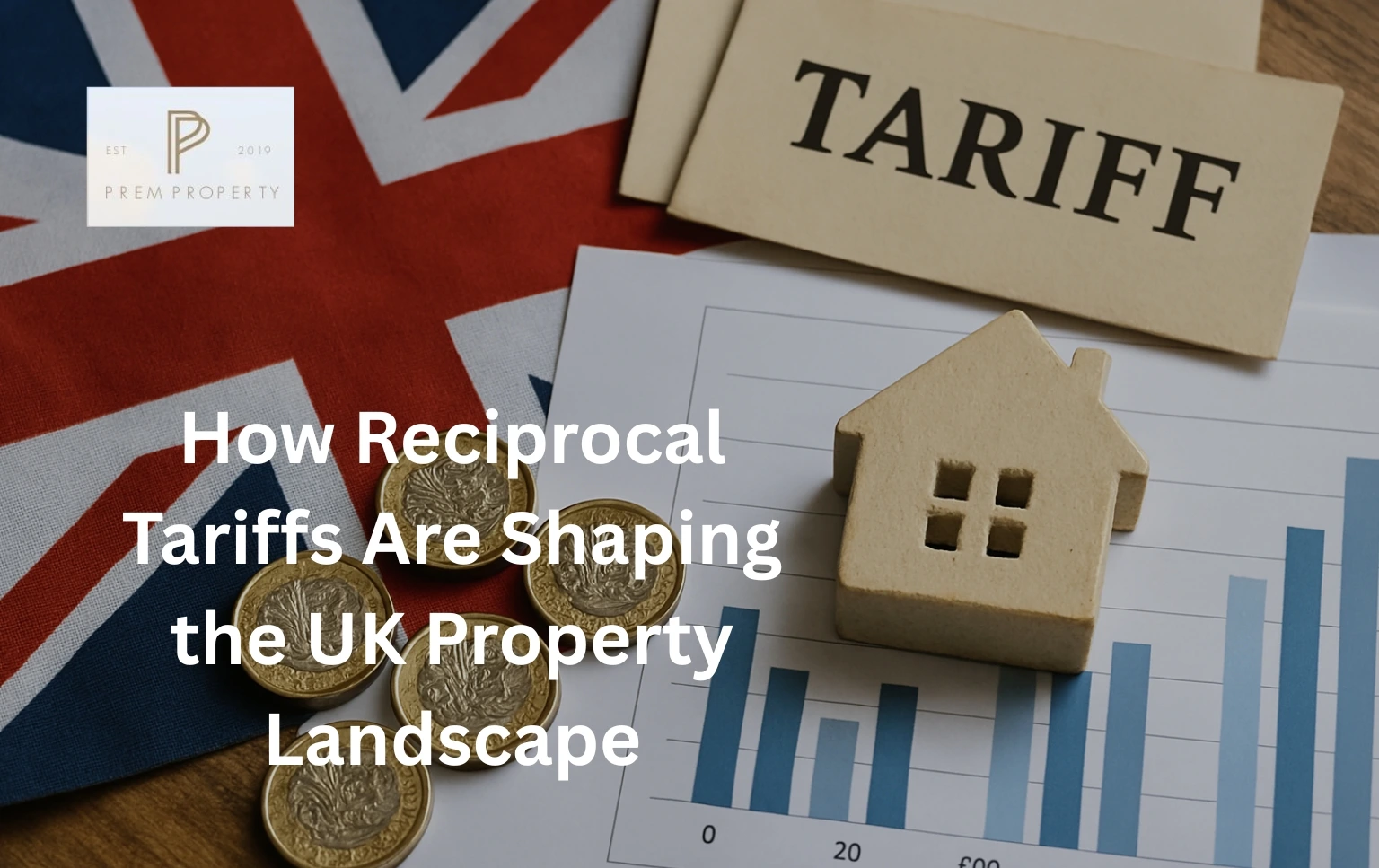In the wake of a changing global trade environment, reciprocal tariffs have become a key issue for economies worldwide. As nations adopt trade protectionism, the reciprocal imposition of tariffs is a tool used to protect domestic industries, but it also has profound effects on various sectors of the economy—none more so than the property market. In the UK, reciprocal tariffs are creating ripple effects in real estate, influencing everything from property prices to foreign investment flows and construction costs. But how exactly are reciprocal tariffs shaping the UK property landscape?
In this blog, we’ll explore the impact of reciprocal tariffs on the UK property market, unpacking key areas such as housing demand, construction, foreign investment, and regional variations. Additionally, we will look at how the UK government is navigating these challenges, and what future trends we can expect as the global trading environment continues to evolve.
What Are Reciprocal Tariffs?
To understand how reciprocal tariffs affect property, it’s important to first grasp the concept of reciprocal tariffs. A reciprocal tariff is a trade policy where one country imposes a tariff on goods from another country, and in return, that country imposes a tariff on goods from the first. This is essentially a tit-for-tat strategy often used to counter unfair trade practices or protect domestic industries.
For example, if the UK were to impose a tariff on imported steel from another country, that country might respond by imposing tariffs on UK exports, including goods and services. The goal is to create a level playing field, though the outcome often results in higher costs for consumers and businesses.
Now, while tariffs typically affect goods, the impact on services and capital markets—like property investment—can be just as significant. Property is inherently tied to the global economy, with foreign buyers and construction supply chains directly influenced by international trade policies. So, how are these reciprocal tariffs making an impact?
1. Impact on Property Prices
One of the most immediate effects of reciprocal tariffs on the UK property market is the potential fluctuation of property prices. The imposition of tariffs can lead to increased costs for certain imported goods, which in turn affects the prices of construction materials, as well as the cost of living in certain areas.
Construction Material Costs
The UK property market has become heavily reliant on imports of building materials, particularly steel, timber, and cement, many of which come from the EU or countries like China and the United States. When reciprocal tariffs are imposed on these materials, their costs can rise significantly. A rise in material costs leads to an increase in the overall construction cost for both residential and commercial developments.
Higher construction costs could deter developers from initiating new projects, particularly in an already competitive property market. As a result, the supply of new properties may decline, pushing property prices upwards, especially in areas where demand for housing is high.
On the other hand, developers may pass these increased costs on to buyers, causing a slowdown in property sales and making homeownership less accessible. For potential homebuyers, particularly first-time buyers, this could exacerbate an already difficult market.
Impact on Property Demand
Another way that reciprocal tariffs influence property prices is through their indirect effects on the economy. When countries impose tariffs, they can slow down economic growth, which often leads to a decline in consumer confidence and a decrease in disposable income. As the cost of goods and services rises, consumers may have less money to spend on property, leading to lower demand in certain market segments.
Additionally, with inflation rising due to higher tariffs on imports, some buyers may delay or reconsider their property purchases altogether, affecting overall market liquidity. This could be particularly concerning in major urban areas, where prices have been inflated in recent years due to high demand.

2. The Impact on Foreign Investment
Foreign investment plays a significant role in the UK property market, particularly in major cities like London. International buyers often seek UK properties as a safe investment, especially in times of economic uncertainty. However, the introduction of reciprocal tariffs can affect foreign investors’ perceptions of the UK as a desirable investment destination.
Uncertainty in Trade Relationships
One of the key deterrents for foreign investors is the uncertainty that comes with trade wars and the imposition of tariffs. The UK’s post-Brexit trade relationships have already created an atmosphere of unpredictability, and reciprocal tariffs can add another layer of complexity to the equation. Investors from countries that face higher tariffs on their exports to the UK may reconsider their investment decisions due to the increased costs associated with entering the UK market.
In the past, many investors from countries such as China, the US and the Middle East have been attracted to the UK’s stable and transparent property market. However, as reciprocal tariffs create more financial and political uncertainties, these investors may begin to look for alternative markets with lower barriers to entry.
Shifting Investment Preferences
Some foreign investors may begin to seek opportunities in markets where reciprocal tariffs are less of a concern or where the political climate is more stable. This could result in a decline in overseas capital flowing into UK property, especially in luxury and high-end segments of the market. In turn, this could contribute to lower demand and potentially a dip in property prices in areas that were once highly sought after by international buyers.
3. Effect on the Buy-to-Let Market
The buy-to-let (BTL) market has long been an attractive investment avenue for both domestic and foreign investors. The introduction of reciprocal tariffs, however, could have significant implications for the rental market in the UK.
Rising Construction Costs and Housing Supply
As mentioned, tariffs on construction materials can lead to an increase in the cost of developing new rental properties. With fewer new properties being built due to higher construction costs, the overall supply of rental properties may be constrained. This could push rental prices higher, particularly in cities where the demand for rental homes is already high.
In turn, the higher cost of renting could drive tenants to seek more affordable options outside urban centres, leading to changes in the dynamics of regional rental markets. Landlords who rely on rental income may also find it more challenging to maintain profitability in the face of rising costs and potentially lower rental yields.
Changes in Foreign Buy-to-Let Investment
Foreign investors, especially those from nations affected by reciprocal tariffs, might rethink their buy-to-let investments in the UK. Higher costs of entry and an uncertain economic outlook may lead them to focus on other countries with more favourable trade conditions. This reduction in foreign buy-to-let activity could affect property prices in popular areas for international landlords.

4. Regional Variations in Property Impact
Not all regions of the UK will be affected equally by reciprocal tariffs. The impact will largely depend on the specific industries in each region and the degree to which they rely on imported goods.
Urban vs. Rural Impact
London and other major cities like Manchester and Birmingham could experience the most significant changes in property prices due to the international nature of their property markets. These cities attract a large amount of foreign investment, and as tariffs begin to affect that investment, the property market may experience fluctuations.
Conversely, more rural areas or smaller towns that rely less on international investment may feel less of a direct impact. However, regional variations in property demand, influenced by changing employment patterns and lifestyle choices, could alter the way tariffs impact property prices across the UK.
5. The Role of Government Policy in Mitigating the Effects of Tariffs
The UK government plays a crucial role in mitigating the effects of reciprocal tariffs on the property market. Through fiscal policies, tax incentives, and trade negotiations, the government can seek to reduce the negative impacts on property prices and foreign investment.
Trade Deals and Investment Incentives
In order to offset the effects of reciprocal tariffs, the UK government can negotiate trade deals that reduce tariffs on key construction materials and other goods that influence property prices. Additionally, providing tax incentives for property developers and foreign investors could help boost activity in the sector, ensuring that the property market remains competitive.
Affordable Housing Initiatives
In an effort to address rising housing costs and the potential slowdown in the property market, the government can focus on promoting affordable housing initiatives, ensuring that more people have access to homeownership or rental properties despite the challenges presented by tariffs.
The Future of the UK Property Market Amid Reciprocal Tariffs
Reciprocal tariffs are undoubtedly shaping the UK property market in a variety of ways. From rising construction costs and fluctuating property prices to changes in foreign investment, the full effects are still unfolding. However, with proactive government policies, strategic trade negotiations, and an emphasis on sustainable housing, the UK property market has the potential to weather the storm and continue to thrive. For investors and property buyers alike, it’s crucial to stay informed and adapt to the ever-changing landscape in order to make the most of the opportunities that lie ahead.

